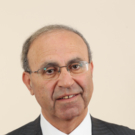Speakers

Hanna Swaid
Chairman
Arab Centre for Alternative Planning
Moderator
Event Summary
On March 5, 2020, Arab Center Washington DC (ACW) held an event titled “Israel’s Parliamentary Elections: Domestic and Regional Implications.” The featured speaker was Hanna Swaid, a Palestinian citizen of Israel who formerly served as a member of the Israeli Knesset (2006-2015) and is currently chairman of the Arab Center for Alternative Planning. Yousef Munayyer, a non-resident fellow at ACW, served as a discussant, and ACW Director Khalil E. Jahshan moderated the event and the conversation with Dr. Swaid.
Hanna Swaid offered some initial remarks about the results of the Israeli elections that took place on March 2, which resulted in the Arab Joint List—a union of four major Arab political movements—winning 15 seats. The latest huge turnout of Palestinian Arab citizens in Israel, he said, brought about their highest Knesset representation in history. To him, this was the most important result of the election for Palestinian citizens of Israel. Swaid explained that this outcome means that there are now two general camps in the Israeli political system: the “extreme right,” with 58 seats in the Knesset, and the “center soft right”—along with the Arab Joint List—with 55 seats. There are also 7 members who represent Lieberman’s Yisrael Beiteinu, Swaid added. At present, there is a stalemate because Benjamin Netanyahu’s Likud Party is unable to form a governing coalition while Benny Gantz’s Blue and White Party does not want to ally with Likud.
Yousef Munayyer said that Gantz and Netanyahu made two different bets in their campaigns. Gantz’s strategy was to make the election a referendum on Netanyahu’s fitness to serve as prime minister, in light of his troubles with the law. However, Munayyer noted, Gantz’s party did not offer alternatives to Netanyahu’s policies; essentially Gantz’s line was that Blue and White was like Likud, but without an indicted leader at the top. In responding to criticism that the party was weak, Gantz’s party recruited Israeli generals to project strength and to reinforce the themes of ethics and democratic principles.
For his part, Munayyer continued, Netanyahu banked on centering his campaign around the core tenets of anti-Arabism and expansionism into Palestinian territory. This was the winning game plan that speaks to a central ethos in Israeli society: that ever since the founding of Israel, Zionism has always trumped democratic principles.
In responding to a question from Jahshan regarding Israeli President Reuven Rivlin’s remarks about his displeasure with the election campaign and process, Swaid pointed to the rivalry between Rivlin and Netanyahu. He said that Rivlin views Netanyahu’s actions as based in greed—that he intends to “remain as prime minister forever.” The president is trying to force Likud and the Blue and White Party to form a national unity government, with Likud perhaps headed by a different prime minister than Netanyahu. Swaid remarked that Israeli democracy is now in a terrible collapse, with half the country—the extreme right—supporting Netanyahu despite his criminal indictments, and everyone not considering Arab citizens as part of Israeli society. He asked, why does the Israeli establishment allow Palestinian citizens to vote, but then not count their interests? He answered by concluding that “Israeli democracy is a hollow one.” He also asserted that one of the major results of the election is the complete collapse of Israel’s Zionist Left; indeed, the Labor Party—in a coalition with the left-wing Meretz and others—won only 7 of 120 seats. Swaid said that this opens the way for new coalitions, such as one between the Palestinian Joint List and Meretz, as an example.
Jahshan asked Swaid if these elections prove that there is a glass ceiling for Arab citizens—in essence, that there is a limit to their political activity because, at base, they are not considered a legitimate partner in Israeli politics. Swaid agreed, saying that the high turnout of Arab voters in this election was not necessarily meant to change government; rather, these voters were concerned about Netanyahu’s incitement and wanted to show Palestinian unity and to defend themselves.
Munayyer noted the historic voter turnout among Palestinian citizens of Israel, but wondered whether, as in the past, they would eventually feel betrayed by Israeli parties, to whom they have lent support. He asked, how do you capitalize on this recent political involvement so that voters do not become demoralized? How do you keep this community energized and engaged? Swaid answered that the high voter turnout—about 66-67 percent among Arab voters in the most recent election—showed preference for a united list, which gives Palestinian Arabs confidence and power. Swaid argued that Palestinian citizens would like to have more impact on Israeli politics and to constitute the third major party in the Knesset. It is clear, however, that the Israeli government treats its Arab citizens unequally and continues to buttress the military occupation of Palestinian land. The policies of Netanyahu and Gantz are no different in this regard, Swaid asserted, saying that this was unacceptable.
Jahshan posed this question: did the Trump peace plan play a direct role in influencing the Arab vote? Swaid stated that Arab voters were very concerned about the plan’s aim to strip Arab citizens of the Triangle region of their Israeli citizenship and to transfer their governance to the Palestinian Authority. He noted that this idea made a huge impact on the Arabs in Israel and motivated them to vote. Swaid asserted, however, that the upcoming November elections in the United States are even more crucial for Israel’s future, as its government abides by the will of the White House. Further, many Americans have become more critical of Israel, he said, and even presidential candidates, such as Bernie Sanders, characterize Netanyahu as racist.


